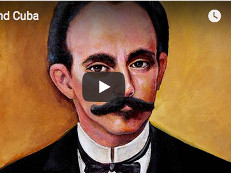For this week’s blog post, I want to discuss Marti’s narrative. In Puerto Rico, Marti is revered as one of the most influential intellectuals of the Caribbean in the last two centuries. Thus, I desired to historically investigate his contribution. Namely, this post will attempt to explain and contextualize Marti’s “Nuestra America.”
The article was written in 1891 in New York. It’s written as a direct response to the first Pan-American Conference that took place in 1890. The conference tried to establish a diplomatic relationship between North and Latin America. Thus, the utmost objective of the meeting was the establishment of Pan-Americanism as a new way of interaction between the two hemispheres. But, José Martí did not agree with this conceptualization of uniting these two hemispheres. He tried to oppose this concept by emphasizing the differences between the United States and “Our America.“
To understand Martí‘s essay, it’s also crucial to analyze what was happening in Cuba. Under Spanish occupation, Cuba was struggling hard to become independent from Europe, while also fighting the potential threat of its neighbor North America. After the U.S. had successfully taken over California, New Mexico, Arizona, Nevada, and Utah as well as parts of Colorado, Wyoming, and Kansas from its neighbor Mexico, it seemed to be more and more interested in Cuba as another addition to its territory. In addition to this threat from Cuba‘s North American neighbor, it was still trying to liberate itself from its colonizer in Europe. After the Grito de Yara in 1868, the first declaration of independence, Cuba was at war with Spain for ten years, which very much helped it to form a distinctive Cuban identity, but also had profound impacts on its economy. In the Paz de Zanjón (Peace of Zanjón) Spain tried to make some minor concessions that were rejected by the rebels. José Martí then founded the Revolutionary Party of Cuba in 1892 and mobilized Cuba to rise again against Spain in 1895.
This is the situation in which José Martí wrote his famous essay “Nuestra América.“ He tries to create a Latin American identity and to liberate Latin America from the oppression of the powerful neighbor North America and the former colonizer Europe. The article is addressed to his own people, especially Cuban intellectuals living in exile, as a call for unity and shared identity, but also to Europe and the United States for them to understand the differences between North America and Latin America.

